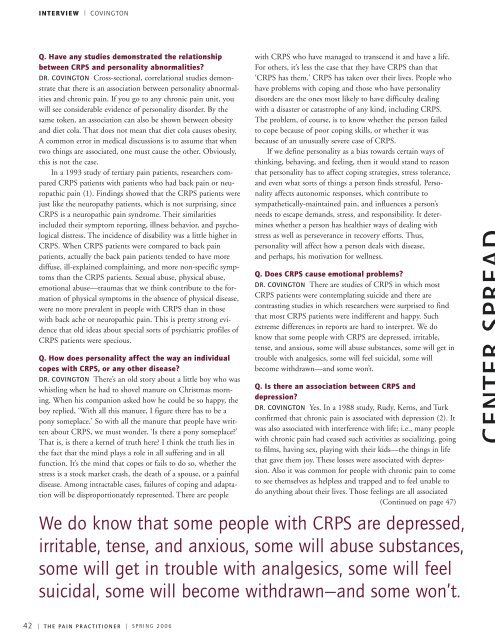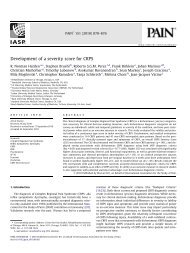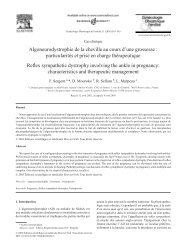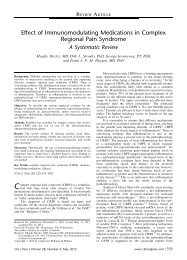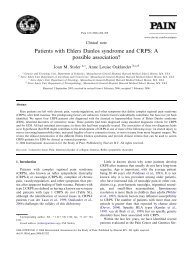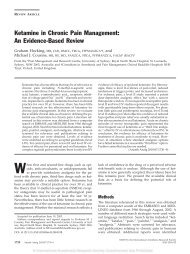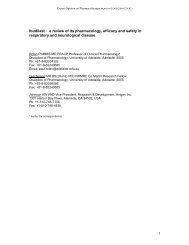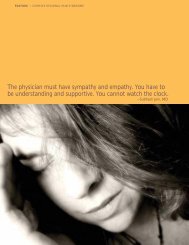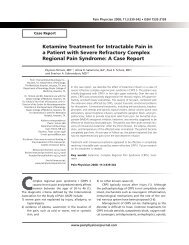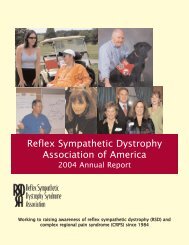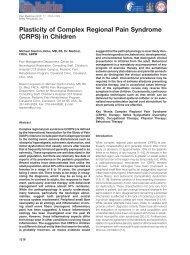printer-friendly version (PDF) - Reflex Sympathetic Dystrophy ...
printer-friendly version (PDF) - Reflex Sympathetic Dystrophy ...
printer-friendly version (PDF) - Reflex Sympathetic Dystrophy ...
You also want an ePaper? Increase the reach of your titles
YUMPU automatically turns print PDFs into web optimized ePapers that Google loves.
INTERVIEW | COVINGTON<br />
Q. Have any studies demonstrated the relationship<br />
between CRPS and personality abnormalities?<br />
DR. COVINGTON Cross-sectional, correlational studies demonstrate<br />
that there is an association between personality abnormalities<br />
and chronic pain. If you go to any chronic pain unit, you<br />
will see considerable evidence of personality disorder. By the<br />
same token, an association can also be shown between obesity<br />
and diet cola. That does not mean that diet cola causes obesity.<br />
A common error in medical discussions is to assume that when<br />
two things are associated, one must cause the other. Obviously,<br />
this is not the case.<br />
In a 1993 study of tertiary pain patients, researchers compared<br />
CRPS patients with patients who had back pain or neuropathic<br />
pain (1). Findings showed that the CRPS patients were<br />
just like the neuropathy patients, which is not surprising, since<br />
CRPS is a neuropathic pain syndrome. Their similarities<br />
included their symptom reporting, illness behavior, and psychological<br />
distress. The incidence of disability was a little higher in<br />
CRPS. When CRPS patients were compared to back pain<br />
patients, actually the back pain patients tended to have more<br />
diffuse, ill-explained complaining, and more non-specific symptoms<br />
than the CRPS patients. Sexual abuse, physical abuse,<br />
emotional abuse—traumas that we think contribute to the formation<br />
of physical symptoms in the absence of physical disease,<br />
were no more prevalent in people with CRPS than in those<br />
with back ache or neuropathic pain. This is pretty strong evidence<br />
that old ideas about special sorts of psychiatric profiles of<br />
CRPS patients were specious.<br />
Q. How does personality affect the way an individual<br />
copes with CRPS, or any other disease?<br />
DR. COVINGTON There’s an old story about a little boy who was<br />
whistling when he had to shovel manure on Christmas morning.<br />
When his companion asked how he could be so happy, the<br />
boy replied, ‘With all this manure, I figure there has to be a<br />
pony someplace.’ So with all the manure that people have written<br />
about CRPS, we must wonder, ‘Is there a pony someplace?’<br />
That is, is there a kernel of truth here? I think the truth lies in<br />
the fact that the mind plays a role in all suffering and in all<br />
function. It’s the mind that copes or fails to do so, whether the<br />
stress is a stock market crash, the death of a spouse, or a painful<br />
disease. Among intractable cases, failures of coping and adaptation<br />
will be disproportionately represented. There are people<br />
with CRPS who have managed to transcend it and have a life.<br />
For others, it’s less the case that they have CRPS than that<br />
‘CRPS has them.’ CRPS has taken over their lives. People who<br />
have problems with coping and those who have personality<br />
disorders are the ones most likely to have difficulty dealing<br />
with a disaster or catastrophe of any kind, including CRPS.<br />
The problem, of course, is to know whether the person failed<br />
to cope because of poor coping skills, or whether it was<br />
because of an unusually severe case of CRPS.<br />
If we define personality as a bias towards certain ways of<br />
thinking, behaving, and feeling, then it would stand to reason<br />
that personality has to affect coping strategies, stress tolerance,<br />
and even what sorts of things a person finds stressful. Perso -<br />
nality affects autonomic responses, which contribute to<br />
sympathetically-maintained pain, and influences a person’s<br />
needs to escape demands, stress, and responsibility. It determines<br />
whether a person has healthier ways of dealing with<br />
stress as well as perseverance in recovery efforts. Thus,<br />
personality will affect how a person deals with disease,<br />
and perhaps, his motivation for wellness.<br />
Q. Does CRPS cause emotional problems?<br />
DR. COVINGTON There are studies of CRPS in which most<br />
CRPS patients were contemplating suicide and there are<br />
contrasting studies in which researchers were surprised to find<br />
that most CRPS patients were indifferent and happy. Such<br />
extreme differences in reports are hard to interpret. We do<br />
know that some people with CRPS are depressed, irritable,<br />
tense, and anxious, some will abuse substances, some will get in<br />
trouble with analgesics, some will feel suicidal, some will<br />
become withdrawn—and some won’t.<br />
Q. Is there an association between CRPS and<br />
depression?<br />
DR. COVINGTON Yes. In a 1988 study, Rudy, Kerns, and Turk<br />
confirmed that chronic pain is associated with depression (2). It<br />
was also associated with interference with life; i.e., many people<br />
with chronic pain had ceased such activities as socializing, going<br />
to films, having sex, playing with their kids—the things in life<br />
that gave them joy. These losses were associated with depression.<br />
Also it was common for people with chronic pain to come<br />
to see themselves as helpless and trapped and to feel unable to<br />
do anything about their lives. Those feelings are all associated<br />
(Continued on page 47)<br />
We do know that some people with CRPS are depressed,<br />
irritable, tense, and anxious, some will abuse substances,<br />
some will get in trouble with analgesics, some will feel<br />
suicidal, some will become withdrawn—and some won’t.<br />
42 | T H E PA I N P R A C T I T I O N E R | S P R I N G 2 0 0 6


